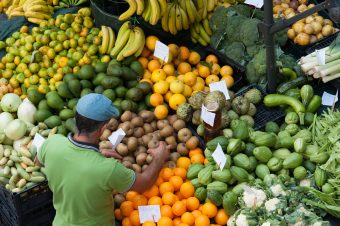
Over 70 wild relatives of some of the world’s most important crops are threatened with extinction, according to a new IUCN co-authored study launched today at the IUCN World Conservation Congress in Marseille. These plants, native to Mexico, Guatemala, El Salvador and Honduras, provide genetic resources that are necessary to breed crops worldwide with greater resilience to climate change, pests and diseases, as well as to improve yields.
“In today’s fast-changing world, genetic diversity is crucial to making our crops resilient to climate change. We need biodiversity to ensure sustainable livelihoods and food security for the world’s growing population, as this study shows,” said IUCN Director General Dr Bruno Oberle. “These results also highlight the urgent need for a strong global biodiversity conservation framework that sets measurable, science-based goals, to ensure a resilient future.”
The paper, published in the journal Plants, People, Planet, analysed 224 plants closely related to maize, potato, bean, squash, chilli pepper, vanilla, avocado, husk tomato and cotton crops. The study found that 35 percent of these wild species are threatened with extinction, as wild habitats have been converted for human use, combined with the shift from traditional agricultural systems to mechanisation and widespread use of herbicides and pesticides. Invasive species and pests, contamination from genetically-modified crops, over-collection and logging pose further threats.
More:
The wild plant groups at highest risk of extinction are Vanilla with all eight species in the region listed as Endangered or Critically Endangered on The IUCN Red List of Threatened Species (TM), followed by 92 percent of cotton (Gossypium) and 60 percent of avocado (Persea) species found to be threatened. Two groups related to maize, Zea and Tripsacum, are 44 percent and 33 percent threatened respectively. Thirty-one per cent of bean species, one out of four chilli pepper species, 23 of potato species, 12 percent of husk tomato species, and 9 percent of squash species are further threatened with extinction.
To date, at least sixteen crop wild relatives included in this study have been used to breed food crops that are more resilient to the changing climate, extreme weather and other threats. These include breeding squashes to withstand cold, maize capable of producing higher yields and potatoes resistant to drought as well as to late blight disease, which historically devastated potato crops in Europe.
“These findings have potentially critical implications for livelihoods and food security. It is imperative that conservation and agricultural sectors work together to safeguard Mesoamerica’s crop wild relatives, while supporting rural economies and livelihoods,” said Dr Bárbara Goettsch, Chair of the IUCN SSC Cactus and Succulent Plant Specialist Group and lead author of this Darwin Initiative-funded study. “These species must be protected on the ground through sustainable and diverse agricultural production. At the same time, the genetic diversity of crop wild relatives must be better represented in gene banks.”

“Given Mesoamerica is a centre of origin and domestication of major crops, it is of worldwide importance in the context of global warming that we preserve the region’s crop wild relatives and their genetic diversity, as these plants have evolved in varied environmental conditions,” said Dr José Sarukhán, National Coordinator of Mexico’s National Commission for the Knowledge and Use of Biodiversity (CONABIO). “Local people traditionally use these diverse species as food and medicine, and numerous cultural groups have key roles to play in their preservation. Understanding the extinction risk of crop wild relatives is fundamental to develop local, national and regional conservation strategies.”
This study is the result of a collaboration between IUCN and seven partners, including CONABIO, Instituto Nacional de Investigaciones Agrícolas y Pecuarias (INIFAP), Instituto de Ciencia y Tecnología Agrícolas (ICTA), Centro Nacional de Tecnología Agropecuaria y Forestal “Enrique Álvarez Córdova” (CENTA) and the University of Birmingham. All 224 crop wild relatives assessed in the study are now published on the IUCN Red List of Threatened Species (TM).
The results reported here are not limited to the region. Other wild relatives of food crops such as banana, apple, prunes and ginger are also threatened, according to the IUCN Red List.
Source: IUCN



